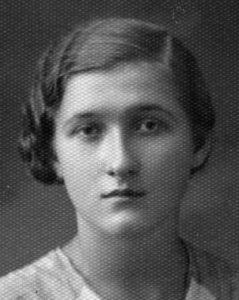– Text / Tekst in Deutsch / English / Polski –
[DE] Anna Makar versteckte mit ihrem Mann Roman 13 Juden unter ihrem Haus. Ihre ständige Aufgabe und Sorge war es, genügend Lebensmittel für alle zu besorgen ohne aufzufallen. Jurek Rotenberg berichtet: „Ich erinnere mich, dass sie um das Haus herumging und heimlich zig Kilo Proviant und andere Vorräte „schleppte“, was äußerst gefährlich und schwierig war.“
read more / Czytaj więcej >
Doch reichte das nicht aus. Anna Makar beauftragte ihre Schwestern, mit Lebensmittelkörben vorbeizukommen, und traf sich insgeheim einmal pro Woche mit Anna Rotenbergs ehemaligem Dienstmädchen Stephania, um zusätzliche Vorräte zu besorgen. Sie alle begaben sich in Gefahr.
Zur Sowjetzeit wurde darüber geschwiegen, dass man Juden gerettet hatte. In der Makar-Familie aber wurden den Kinder und Enkeln vom Holocaust berichtet. Yura Ilkiv, der Enkel von Roman und Anna Makar: „Früher gingen wir mit unseren Kindern in den Wald. Unsere Großeltern zeigten uns Orte, an denen Juden lebendig begraben waren. Die Erde hatte sich noch mehrere Tage lang bewegt. Das sind Massengräber, Erdhügel.“
Warum erzählten Roman und Anna Makar nicht anderen von ihren Rettungstaten? Die Nachfahrin Karen Bijkersma schreibt dazu: „Die Makars waren griechisch-katholisch. Sie gingen zur Kirche, heirateten kirchlich, ließen sich taufen usw. Ich glaube, das gab ihnen ihren moralischen Kompass. Als meine Tante Jura Ilgiv fragte, warum niemand darüber gesprochen habe, sagte er: „Gott weiß es“. Sie fühlten sich nur Gott gegenüber verantwortlich.“
[EN] Anna Makar and her husband Roman hid 13 Jews under their house. It was a constant effort on Anna’s part to find enough food for everyone without raising suspicion. Jurek Rotenberg: “I remember her going around the house and “schlepping” tens of kgs of provisions and other supplies clandestinely, which was extremely dangerous and difficult.”
However, this was not enough. Anna Makar recruited her sisters to come by with baskets of food, and secretly met up with Anna Rotenberg’s former maid Stephania once a week for extra supplies. They all put themselves in danger.
During the Soviet era it was kept a secret about saving Jews. But in the Makar family, children and grandchildren were told about the Holocaust. Yura Ilkiv, the grandson of Roman and Anna Makar: “We used to go to the forest with our children. Our grandparents people showed us places where Jews were buried alive. The earth was still moving for several days. These are mass graves, mounds of earth.”.
Why didn’t Roman and Anna Makar tell others about their acts of rescue? The descendant Karen Bijkersma writes about this: “The Makars were Greek Catholic. They went to church, got married and baptised and so on. I think this gave them their moral compass. When my aunty asked Yura Ilgiv … why no one talked about this he said that “God knows”. They were answerable to God only.”
[PL] Anna Makar wraz ze swoim mężem Romanem ukrywała pod swoim domem 13 Żydów. Jej stałym zadaniem i troską było zdobywanie wystarczającej ilości jedzenia dla wszystkich, bez zwracania na siebie uwagi. Jurek Rotenberg relacjonuje: „Pamiętam, że chodziła wokół domu i potajemnie „taszczyła“ dziesiątki kilogramów prowiantu i innych zapasów, co było niezwykle niebezpieczne i trudne.”
Ale to nie wszystko. Anna Makar poinstruowała swoje siostry, by przychodziły z koszami jedzenia, a żeby zdobyć dodatkowe zapasy, spotykała się potajemnie raz w tygodniu z byłą pokojówką Anny Rotenberg Stephanią. Oni wszyscy narażali się na niebezpieczeństwo.
W czasach sowieckich milczano o tym, że ratowano Żydów. Ale w rodzinie Makarów dzieciom i wnukom opowiadano o Holocauście. Jura Ilkiv, wnuk Romana i Anny: „Dawniej chodziliśmy z naszymi dziećmi do lasu. Nasi dziadkowie pokazywali nam miejsca, gdzie chowano Żydów żywcem. Ziemia poruszała się jeszcze wiele dni. To są masowe groby, kopce ziemi.“
Dlaczego Roman i Anna Makarowie nie opowiadali innym o swoich czynach? Ich potomkini Karen Bijkersma pisze: „Makarowie byli greko-katolikami. Chodzili do kościoła, brali ślub w kościele, zostali ochrzczeni itp. Myślę, że to dało im ich moralny kompas. Kiedy moja ciocia zapytała Jurę Ilgiva , dlaczego nikt o tym nie mówił, powiedział: „Bóg wie“. Oni czuli się odpowiedzialni tylko przed Bogiem.„
